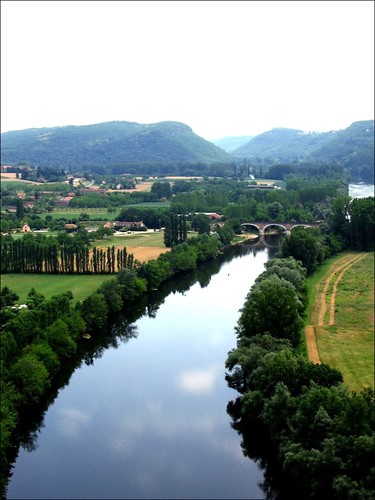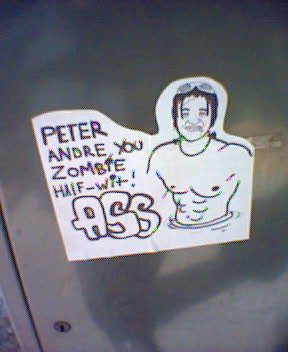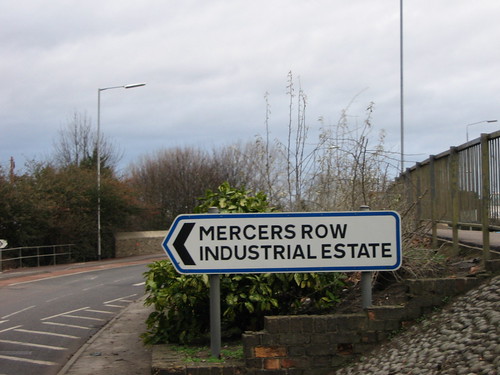If you’ve seen one melting skyskraper, you’ve seen them all
Or so I thought. I’d seen a few of Frank Gehry’s buildings in the form of pictures or models, and perhaps in the flesh from a distance, and, while they’re undeniably attractive, they also seemed perhaps a little pointless. With the technological ability to produce buildings where the external form is more or less unconstrained by the builing’s purpose, I didn’t see any reason for him to choose the forms he actually uses, except for a kind of bland rococoism. But I had the chance to walk around his Music Center when I was in Los Angeles last week, and I’ve rather changed my mind. The way in which the petals of the structure open up to include a park, or to hide a Children’s Amphitheatre in a nook, or to reach out towards the skyscrapers of downtown Los Angeles, or the strangely growing pillars that support the interior of the concert hall itself are both beautiful and, in surprising ways, functional.
The mountains of the moon
There’s an area of Uganda sometimes called the mountains of the moon. Among other things, it’s famous for its gigantic flaura and fauna; six meter high heather, the world’s largest elephants, that sort of thing (a perfect foil for colonialist representations of Africa, of course; I first heard of the place through Willard Price’s kinda racist Adventure series). What no-one told me, though, is that America is a kind of mountains of the moon, as well. Of course the roads and the cars are enormous; hell, our cooker is ludicrously big, and if the kitchen wasn’t such a tip right now I’d show you a picture. What’s only become apparent now that spring has more or less arrived is that the plants have the same gargantuan quality:
And a couple of other quite nice pictures of Berkeley while I’m at it:
Third prize
… in the ‘Nature’ category at Burneston and Carthorpe Village Show:
Being in the countryside for a while means I got a chance to enter this picture in the afformentioned village show. It does, though, mean I’ve mostly been doing nothing and so, as a consequence, haven’t had anything to post about here. I have been reading Being and Nothingness, which I’m enjoying a great deal, but I’m not really sure what I want to say about it yet.
I’ve also been re-reading Neal Stephenson’s  Cryptonomicon. It’s mostly just confirmed my original impressions of the book: that the central idea (that matter is data, and vice-versa) is very well drawn throughout the book, but it’s way too fucking long. Some of the length can be excused, as the incidental details which stuff the book are interesting minatures of the overall idea. Not all of them, though: did a section in which a character demonstrates the ability to read a computer screen by radio surveillance, and ends up accidentally spying on a a friend of his writing a soft-porn story have to be illustrated with _all six pages_ of the story? I would have thought not.
Cryptonomicon. It’s mostly just confirmed my original impressions of the book: that the central idea (that matter is data, and vice-versa) is very well drawn throughout the book, but it’s way too fucking long. Some of the length can be excused, as the incidental details which stuff the book are interesting minatures of the overall idea. Not all of them, though: did a section in which a character demonstrates the ability to read a computer screen by radio surveillance, and ends up accidentally spying on a a friend of his writing a soft-porn story have to be illustrated with _all six pages_ of the story? I would have thought not.
I did notice something else, though, which probably explains some of my irritation with the book, and understanding that makes me think slightly higher of Stephenson’s skills. The annoying thing is that the book is told almost entirely from a nerd’s point-of-view. What’s interesting, though, is that in the three main strands of the book we inhabit the consciousness of three different _sorts_ of nerd: there’s the science-fiction/fantasy geek, hacker Randy; stunted adolescent, US Marine Bobby Shaftoe; and borderline-autistic maths genius Lawrence. Clearly, then, the towering nerdiness of the book is an intentional effect carefully orchestrated by the author. Over the course of 800 or so pages, though, it’s a lot like being trapped with a bunch of Chemistry students.
The book is apparently the prequel to a trilogy about the origins of capitalism. I’m not sure it’s encouraging, then, that it seems to end with some kind of nonsense about re-establishing the gold standard.
Unplaced in the ‘Water’ category:
Pictures
UC Berkeley:
The Financial District, San Francisco:
Cheering me up on my way to work this week
“Under communism it’s Christmas every day”
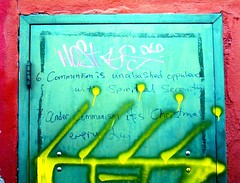 You find the best stuff on Flickr, sometimes.
You find the best stuff on Flickr, sometimes.
Is this a good argument?
Extracted from something I’m currently writing, this only occurred to me as I was writing it; I hadn’t intended to make it part of the argument. Should I change my mind?
> The difficulty of extracting a political theory from the circulating received opinions of the situation is made
> even more difficult today when the present is construed as itself a site of novelty, a period of change. The
> ‘end of history’ as a series of epochal events (the collapse of the Berlin Wall or the 9/11 attacks) makes the
> future part of the present as we are told we are living in a time in which ‘nothing will ever be the same’.
> Looking to the future to find political possibilities outside of the present thus begins to seem impossible as
> we are faced with the task of going further than Lenin and being even more radical than reality.
Mercers Row
A few days after I first moved to Cambridge, I got mildly freaked out by wandering around the ridiculous Victorian gothic town centre. So, setting of in a more or less random direction, I eventually found myself on Newmarket Road. I was shocked to find I’d arrived in something like a real town; Newmarket Road (and, more generally, the Abbey area) is where Cambridge industry, such as it was used to be. So yesterday, I headed in that direction again, taking advantage of the fact that, from where I live, it’s a walk along the river; I took some photos, which you can find at the link above.













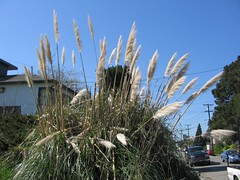
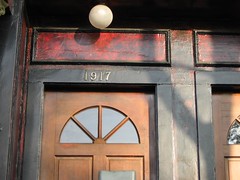


 Cryptonomicon
Cryptonomicon